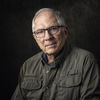Check out Software and Computer Support for Photographers section of our forum.
F stop and depth of field
Jan 5, 2015 23:18:55 #
Apaflo wrote:
If you don't know how it works, it's "dead&qu... (show quote)
Cool story. But it is about incompetence and failure to plan. It does not address the issue. It also shows how local knowledge can be helpful. It does not answer my question, however.
Jan 5, 2015 23:21:32 #
pmackd wrote:
Back in the day, pilots flying across oceans, like mariners, learned celestial navigation and carried a sextant.
Yes. I crewed some DC-8s that had the sextant hole in the ceiling. Today, 3 GPS units are better!
Jan 5, 2015 23:27:49 #
I just hope I'm hanging out with guys like oldtigger and Apaflo if we ever have a major coronal mass ejection solar flare. I think we would survive! And I would be good to have around during a zombie apocalypse. :twisted:
Check out Underwater Photography Forum section of our forum.
Jan 5, 2015 23:35:55 #
CaptainC wrote:
Cool story. But it is about incompetence and failure to plan. It does not address the issue. It also shows how local knowledge can be helpful. It does not answer my question, however.
Captain, it does address your question. It wasn't local knowledge that made the difference. In fact that pilot had been there more often than I had. He's in the business of flying airplanes by rote and by note. I'm in the business of trouble shooting problems. His world is pre defined, mine is only what I can make out of it. He had a list of memorized actions that accomplish his job, and on that day he came across a situation where none of them worked. And as a newcomer to Arctic Alaska I'm sure he was well aware (and happy about it) of just exactly how remote he was from everything he'd learned. And all of a sudden, he was totally lost in the biggest expanse of "nowhere" that he could imagine. Like I said, his mind turned to jello.
I had never been exactly where we were, just south of St Michael. And it wouldn't have made any difference anyway. The business of knowing how things work, and being able to stay calm in the face of the unknown because of that knowledge, is what made that situation easy to work out. It wasn't obvious in an instant, because it wasn't a trained "how to" response. But I never thought for an instant that it was something I wouldn't be able to figure out. The pilot knew he was gonna die! I was ready for lunch...
Jan 5, 2015 23:51:06 #
Apaflo wrote:
Captain, it does address your question. It wasn't... (show quote)
The pilot was ill prepared, and relied on his loran rather than common sense, his compass, and pilotage when he dropped out of the clouds. He probably didn't bring a chart because all those lakes look alike & he had that new fangled Loran. Not someone I would fly with. Is he still around? That must have been a while ago. He didn't have you to save him on his later trips.
Jan 6, 2015 00:00:38 #
Jan 6, 2015 00:10:05 #
How did we get from depth of field to celestial, grid, pressure pattern and GPS navigation? I feel like I'm back at Naval Air Station Corpus Christi taking advanced air nav in 1970 (minus the GPS). Perhaps you guys should start another thread!

Jan 6, 2015 00:27:40 #
Muddyvalley wrote:
The pilot was ill prepared, and relied on his loran rather than common sense, his compass, and pilotage when he dropped out of the clouds. He probably didn't bring a chart because all those lakes look alike & he had that new fangled Loran. Not someone I would fly with. Is he still around? That must have been a while ago. He didn't have you to save him on his later trips.
He was in fact flying absolutely by the book!
You aren't thinking about what he is going to do with "common sense, his compass, and pilotage when he dropped out of the clouds"! All of his training, and the "book" that he was required to fly by, said that he would be in a specific spot where those items would in fact allow him to proceed. Except he wasn't in that spot, and none of those items would do him a bit of good.
And Loran was not exactly a new fangled thing by the late 80's. Loran-C had already been around for 30 years, replacing Loran-A. Incidentally, we were relatively a short distance from the Port Clarence Loran site north of Nome.
He was not supposed to ever get even close to those lakes, and they were way off in the distance too.
I don't know, but imagine he went on to great things. Experience flying with Bering Air out of Nome looks pretty good on a resume even today. You say you wouldn't fly with him, but not only why not, but how would you ever know? You go to the Bering Air office and tell them you want to go somewhere. They tell you what airplanes they have available and when there will be a pilot. You don't choose the pilot. (Granted there are some, not with that company, that I decided I'd never fly with again, and would develop "weather problems" if they was going to be the pilot. And more than one of those died in an airplane crash too.)
Jan 6, 2015 00:27:47 #
[quote=dynaquest1]How did we get from depth of field to celestial, grid, pressure pattern and GPS navigation? Iquote]
we got here because someone decided on page 1 that the OP was stupid to try learn anything and would be better off just blindly snapping pictures.
we got here because someone decided on page 1 that the OP was stupid to try learn anything and would be better off just blindly snapping pictures.
Jan 6, 2015 08:38:23 #
oldtigger wrote:
I know different ways to attain focus by hand, but I don't necessarily fully understand the method used to autofocus every particular camera I own. Similarly, the several camera systems I own use several different means to stabilize an image, but I know the particulars of only one of them - but all of them seem to get the job done.you have chosen to use gps, if it fails go to your backup system, pipeline, coastline, or a man walking ahead of you with a swinging lantern.
A more realistic situation would be auto focus; a useful and powerful tool which will bite you in the but if you don't understand manual focus and the errors auto focus can make.
A more realistic situation would be auto focus; a useful and powerful tool which will bite you in the but if you don't understand manual focus and the errors auto focus can make.
Jan 6, 2015 09:51:22 #
oldtigger wrote:
we got here because someone decided on page 1 that the OP was stupid to try learn anything and would be better off just blindly snapping pictures.
we got here because someone decided on page 1 that the OP was stupid to try learn anything and would be better off just blindly snapping pictures.
When did it become the norm to discourage the learning process? I applaud the OP for wanting to learn more, to expand his horizons in any area that he finds an interest in. The naysayers seem to be of the same mind that gave us new math, a 'dumbed down America', and a disengaged population who stare vacantly at their phones. Maybe OP would have gone on to greater things with encouragement, jumped into the field of metamaterials and helped us all escape the limitations of glass with a new array of flat lenses for our cameras.
http://en.wikipedia.org/wiki/Flat_lens
Check out Professional and Advanced Portraiture section of our forum.
Jan 6, 2015 10:55:44 #
NormanHarley wrote:
Learning is fine. My point was that one can be an excellent photographer without that particular knowledge, just as one can be an excellent photographer without having my wife's knowledge of the duality of light (she has a PhD in Theoretical Physical Chemistry).When did it become the norm to discourage the lear... (show quote)
Jan 6, 2015 11:03:10 #
These discussions may help you better understand Aperture:
http://www.cambridgeincolour.com/tutorials/depth-of-field.htm
http://photography.about.com/od/takingpictures/ss/DOF_2.htm
http://www.exposureguide.com/focusing-basics.htm
Happy New Year!
http://www.cambridgeincolour.com/tutorials/depth-of-field.htm
http://photography.about.com/od/takingpictures/ss/DOF_2.htm
http://www.exposureguide.com/focusing-basics.htm
Happy New Year!
thom w wrote:
How does F stop effect depth of field. Not what is the effect, I know that. How does it work? Years ago I played with pinhole cameras. Is it like that. Is a high F stop (small aperture) like adding another element? If I should just go read a book I can do that. Thank you anyone who answers.
Jan 6, 2015 11:14:32 #
NormanHarley wrote:
When did it become the norm to discourage the lear... (show quote)
Now Norman, nobody ever discouraged the learning process. Your response says more about your political views than addressing the issue. The point was that while it is fine and interesting and fascinating to learn about the inner workings of things, there are times when that knowledge is of more of an academic nature than practical. That is a fact, it is provable and it is obvious. Don't twist it and make it more than it is.
Read one of Stephen Hawking's books. Interesting and fascinating, but the knowledge there does not do a thing for our daily lives. That's all.
Jan 6, 2015 11:41:48 #
CaptainC wrote:
Now Norman, nobody ever discouraged the learning p... (show quote)
Thank you for addressing my political nature. That reminds me of a friend telling his young daughter, who was struggling with mathematics at the time, "Don't worry, honey. You're so pretty." Your remark was a well intentioned aside, I am sure. I try to never impose my self perceived limitations of another's pursuit of a like field. Yes, understanding the duality of light, as rehess stated, may not help him to take better pictures. But what if, just maybe, it were to help someone else in their quest to create better art? Believing that Stephen Hawking's book "does not do a thing for our daily lives" is made from your perceptions and limitations. For another person, it may become a life long endeavor of using the concepts to improve our lives here on Earth.
If you want to reply, then register here. Registration is free and your account is created instantly, so you can post right away.
Check out Software and Computer Support for Photographers section of our forum.








